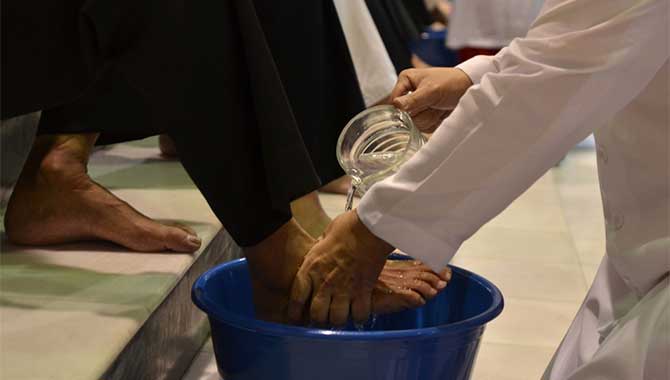May 30, 2021
I give you a new commandment, that you love one another. Just as I have loved you, you also should love one another. ~ John 13:34
We don’t think ourselves into a new way of living; we live ourselves into a new way of thinking. ~ Center for Action and Contemplation
Two weeks ago, Ro and I went for a hike at Canyonlands National Park. I read the sign at the trailhead. “Water is scarce. Bring at least one gallon for long trails. Avoid walking during peak heat on summer days.” “Whatever,” I thought. “That’s for tourists and besides it’s springtime and there’s a slight breeze.” I checked my watch, 12:30 P.M. I put two 32-ounce water bottles (half a gallon) and six granola bars in my pack. Ro strapped on his Camel-Pak and off we went for a meandering ten and a half mile walk through the red rock canyons blooming with desert flowers.
Somehow, we, I, miscalculated the distance of our walk. Our 10.5-mile hike turned into a 14.5-mile slog through the high desert. We ran out of precious water with over four miles left to walk. Ro said, “I’m not worried.” I was tired, the sun was unrelenting, my leg was cramping, and we still had two or three canyons to hike up and down. I thought about that sign, “Carry at least a gallon of water on long trails.” Now, I understood. We learn by doing.
One of the core principles for the Center for Action and Contemplation is “we don’t think ourselves into a new way of living; we live ourselves into a new way of thinking.”
There is nothing that Jesus says that he does not do. He tells us to forgive seven times seventy times (see Matthew 18:21-22). Forgiveness sets us free from the cycle of blame and pain and breaks the cycle of ungrace. Forgiveness is healing, yet we are often reluctant to forgive.
For myself, maybe you, we hurt someone else, or someone hurts us. The pain, the anger, and the injustice consume us. We want vindication, we want to get even, we want an apology, we want to be right. Forgiveness is the furthest thing from our thoughts. Our anger eats us up and consumes us day and night. We are miserable. “We cannot think ourselves into good action (i.e., forgiveness), but we can act ourselves into good thinking,” (Voices of Recovery). Our willingness to forgive as Jesus suggests leads us to healing the wreckage of our lives.
Saint Francis told his friars, “You can only know as much as you do.” John Wesley, the founder of the Methodist Movement knew, “People act their way into believing.”
It is one thing to believe in Jesus and quite another thing to live like Jesus. Do we “Practice the way of Christ”? Jesus says forgive one another, put down your swords (weapons), turn the other cheek, love your enemies, do not judge, do not condemn, serve the poor, wash feet, live simply, heal the sick and care for the poor. “Once we take action and see that it works, we begin to believe,” (Voices of Recovery).
In his writings, Saint Francis used the word “doing” rather than “understanding” by a ratio of 175 times to 5. Jesus says, “Follow me.” Are we willing to follow the way of Christ? Francis, Wesley, Day, Maura Clark, and many other saints emphasized the imitation of the love and grace of Jesus and not just the worshiping of his divinity. This is a major shift reflects Father Rohr. We learn and grow by doing.
Jesus calls us to love one another just as he has loved us (see John 13:34). Jesus did not just come to tell us about life after death but to show us how to live life now. To believe in Jesus was to live like him, to imitate his way of life. Wesley wrote, “In essentials unity, in nonessentials liberty, in all things charity.” Historic Methodists were open to pluralism and diversity because of their commitment to the “catholic spirit.” They were living Christ.
What if Jesus was someone we imitated and not just worshiped? What does it mean for us today to follow Jesus? To live like Christ? What if we knew God in an almost “cellular” or energetic way (Rohr) and not just in our heads?
May we take good actions which lead us to the way of Grace.
May we learn by doing and grow more compassionate and peaceful each day.
Blessings and peace,
Craig

